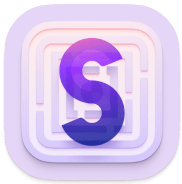Importing items
Wether you're migrating from a previous version of Secrets, another app, or even Apple's Keychain, Secrets supports various file formats to help you get your data across and quickly get up and running.
Once you have imported your data, be sure to delete the imported file. Its contents are not encrypted.
Importing from a previous version of Secrets
All Secrets versions can export your data to two file formats: Secrets XML and SPEF (Secrets Plaintext Export Format). The preferred option is to use SPEF, as that's the only format that supports exporting file attachments.
To import a Secrets XML or SPEF file.
On a Mac:
- Open and unlock Secrets.
- Choose File -> Import… from the menu bar.
- Choose either "Secrets .spef" or "Secrets .xml"
- Click continue and follow the steps to finish the import.
On an iOS device:
- Open and unlock Secrets.
- Tap the ••• button
- Tap Import and then "Secrets (.spef)" or "Secrets (.xml)"
- Follow the steps to choose your previously exported file and finish the import.
Importing from other apps
Secrets has support for various file formats generated by other apps. Namely:
- 1Password (.1pif or .1pux)
- LastPass (.csv)
- Rapido Serial (.csv)
- Password Wallet (.txt)
- Enpass (.json)
- Bitwarden (.json)
- Minimalist (.json)
- Proton Pass (.json)
You'll need to export your data from the other app first. Once you have the exported file you can proceed with following instructions.
On a Mac:
- Open and unlock Secrets.
- Choose File -> Import… from the menu bar.
- Choose the format corresponding to the other app.
- Click continue and follow the steps to finish the import.
On an iOS device:
- Open and unlock Secrets.
- Tap the ••• button.
- Tap Import and then choose the format corresponding to the other app.
- Follow the steps to choose your previously exported file and finish the import.
Import from Apple's Keychain
To export your Login items stored in Apple's keychain you'll need to be running Safari 15 or later on macOS.
In Safari:
- Click Safari in the menu bar and then Preferences/Settings.
- Click on the Passwords tab.
- Click the ••• button and choose "Export Passwords…".
- Confirm you want to export all passwords and save the file locally.
You can now import the generated CSV file into Secrets.
On a Mac:
- Open and unlock Secrets.
- Click File -> Import… from the menu bar.
- Click "Safari .csv".
- Click continue and follow the steps to finish the import.
On an iOS device:
- Open and unlock Secrets.
- Tap the ••• button
- Tap Import and "Safari (.csv)"
- Follow the steps to choose your previously exported file and finish the import.
Importing a generic CSV file
Finally, if your importing from any other app, as long as you can generate a CSV file with your items you should be able to import it into Secrets using the Generic CSV option.
To use this, make sure each CSV file contains only one type of item: Logins, Credit Cards, Bank Accounts, Software Licenses or Notes.
Note down what each of the columns of the CSV file contain: usernames, passwords, notes, etc. When importing Secrets will show a preview of the contents for each column and ask you to specify what it contains.
On a Mac:
- Open and unlock Secrets.
- Click File -> Import… from the menu bar.
- Click "Generic CSV .csv"
- Click continue and choose the type of item the CSV file contains.
- Click continue and proceed to specify what each of the CSV columns contain.
On an iOS device:
- Open and unlock Secrets.
- Tap the ••• button
- Tap Import and "Genetic CSV (.csv)"
- Tap continue and choose the type of item the CSV file contains.
- Tap continue and proceed to specify what each of the CSV columns contain.
